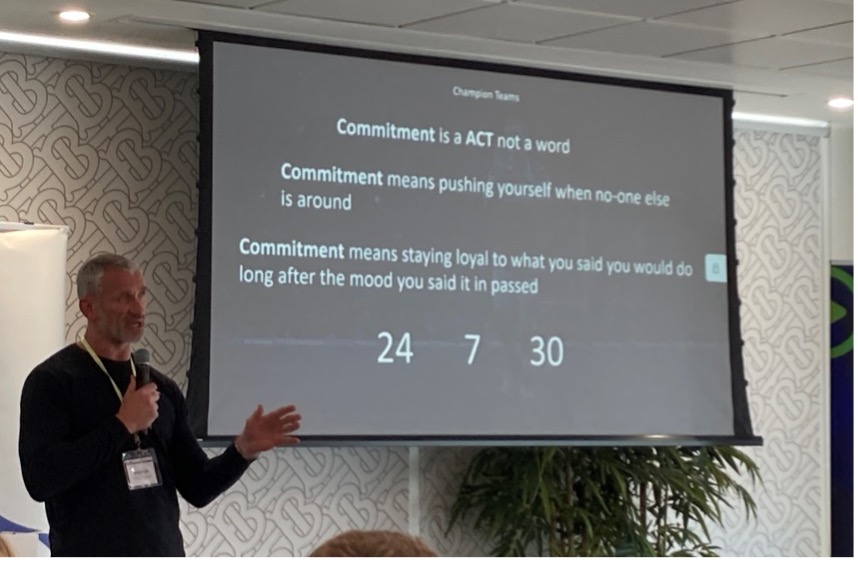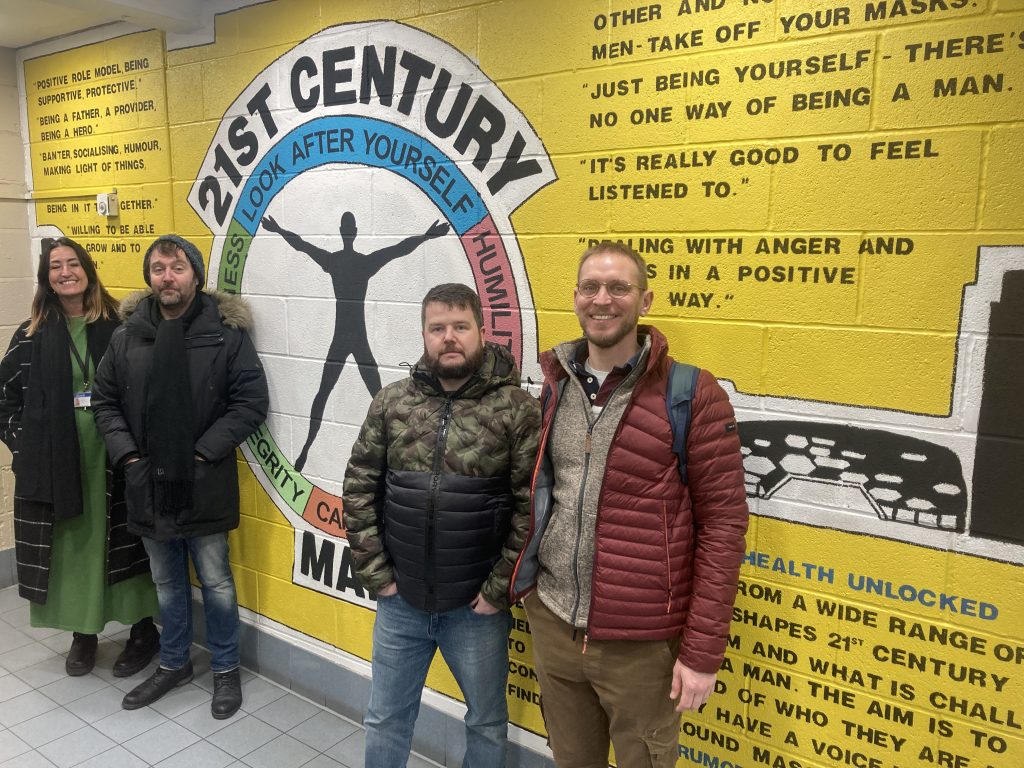Read our Men’s Health Unlocked coordinator Damian Dawtry’s thoughts following this years’ men’s health week.
Kier Construction Workers at a Men’s Health Awareness session (Men’s Health Unlocked)
Men’s health weak? It depends on who you talk to. I was at a workplace seminar on Tuesday, hosted by Burberry, to listen to various speakers talk about men’s mental health, and what we as individuals can do to maintain or improve our own. One of the speakers, Jamie Peacock MBE, Rugby League legend (former captain of England, Great Britain and Bradford Bulls, and one of Leeds Rhinos greatest-ever players ) was, by my observation in the peak of health. Bright, confident, and fit.
Like the other two speakers at this event (Luke Ambler, co-founder of Andy’s Man Club and Andy McAleese, men’s health advocate) organised by the @thisisme movement, he gave great tips on navigating life’s hurdles, using examples from both personal and work life. Jamie’s own “work” examples were pretty exciting. You know, those days when you are leading a GB side out against Australia, on their home patch, and you’ve not beaten them for about 100 years? Yeah, those ones!
His tips for positive attitude were great and I have taken them home. They are:
- Send a positive message to one person per day
- Listen to a positive influence each day
- Each day, write one thing that you are thankful for
- Phone off one hour before bedtime
- Write a to-do list before bed
- Room as dark as possible
- Minimum 20 minutes exercise
- Exercise same time as the day before
- Five portions of fruit and veg
- Drink four pints of water
Jamie Peacock at the @thisisme Men’s Health Week seminar.
Jamie’s talk was part of an event that was marking Men’s Health Week, which this year has run from 10th to 16th June.
Each year, it gives us a chance to reflect and take action upon the areas of health that are most pertinent to men, and to look at how men and society as a whole can help to make men’s health better.
The bad news is that men’s health is weak, at least, compared to women’s health. For example, men are more likely to suffer from heart disease, have diabetes, and suffer from almost all of the cancers. They are much more likely to have workplace accidents, to take their own lives, and engage in risky behaviours such as drugs and alcohol, and to be addicted to gambling. Men are not living longer, and one in five men will die before the age of 60.
The good news is that it is not all doom and gloom. Awareness of men’s health, the need to do something about it, and the wisdom of such an approach, is getting stronger.
At a local level, men’s health work continues to grow, with health research, workplace engagement and men’s groups continuing to grow across the city. Eight years ago, there were approximately three men’s community worker posts in the city. Now, there are probably over 30. The Council has recently appointed a Lead Member for Men’s Health, and Men’s Health Unlocked, the network which seeks to harness all this positive energy and share the resources and the learning that it generates, has secured another 2.5 years’ funding from the Lottery. “Taking a gendered approach” – for men as well as other genders – is starting to be embraced as a wise one to take.
At a national, strategic level, over the last nine months, Parliament has led an inquiry into men’s health, featuring cross-party MPs, national charities and experts from across the country. Whilst the dissolution of Parliament meant that the subsequent report, less than two weeks before publication, had to be binned (arggh!!), it has instead become a seven-page summary, one within which our very own MHU is mentioned, and one which strongly recommends a national men’s health strategy.
Awareness is also growing of the areas of health where men are least well served. For example:
- men account for around 30% of domestic abuse victims, yet (nationally) take-up of domestic abuse services is around the 4% mark.
- Black men are twice as likely to suffer from prostate cancer yet their early diagnosis rate is shockingly low.
- Over 50% of dads who do not see their children are clinically depressed, yet practical and pastoral support for their situation, outside of expensive solicitors, is almost non-existent.
Men’s health mural at Leeds Kirkgate Market (Touchstone / Humans Being / Men’s Health Unlocked)
There is plenty to do, but Men’s Health Week, events such as This is me Yorkshire ’s, parliamentary enquiries and big Lottery grants, give the issue validation. To coin a phrase, it means that not only is it OK to talk, but it is OK to talk about men’s health, and to do something about it.
Happy Men’s Health Week!
Written by Damian Dawtry, Project Manager of Men’s Health Unlocked, a mutli-agency network led by Barca, Forum Central, Orion and Touchstone. He is based at Forum Central and has worked in men’s health for over 8 years.
For a links to men’s health activities, men’s health research, and latest news, go to www.forumcentral.org.uk/mhu and follow @mhuleeds on X.
#ThisIsMe is a national movement supporting mental health in the workplace. https://www.thisismeyorkshire.co.uk/
To find out more about the movement for a national men’s health strategy, go to www.menshealthforum.org.uk/strategy


